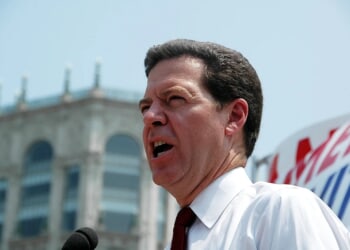Jack Rankin is the MP for Windsor
Horseracing is Britain at its best.
The unrivalled heritage and prestige of the sport is matched by the world leading performances of our horses, trainers and jockeys. In a sport that reaches all corners of the globe, Britain is a leading force.
No part of the country encapsulates this history and success more than my Windsor constituency, which includes both Ascot and Royal Windsor racecourses. The area has links to racing that date back to the sixteenth century and in 1711, Queen Anne founded Ascot racecourse, which is now synonymous with British sporting excellence and pageantry. The course is worth nearly £150 million to the local economy annually, and Royal Ascot, which starts tomorrow, has been a key event in sporting and social calendar for centuries.
It is not just in the beautiful towns and villages of the Windsor constituency where racing leaves its mark. Up and down the land, in cities, towns, villages and rural areas, the sport is the lifeblood of so many people.
Racing is worth £4.1 billion annually to the British economy, generates £300 million annually in taxation, and supports 85,000 jobs. Add to that the nearly five million spectators who enjoy a day at the races each year and it becomes clear that racing really is central to British life.
However, racing, a vital and treasured British institution, now faces a triple whammy of public policy threats: gambling duty harmonisation, a lack of reform of the Horserace Betting Levy and affordability checks on punters. Without considered intervention from the Government on these, the sport in Britain risks falling into critical decline.
As the MP for two fantastic racecourses and a member of the APPG on Racing and Bloodstock, I know how critical it is that this intervention comes as soon as possible to ensure that the sport is sustainably funded long into the future. The APPG today launches its first report into the state of the sport, with a clear call to the Government to back British racing by taking decisive action to safeguard its future.
The most pressing of the three threats that racing faces is a HM Treasury consultation released at the end of April, which proposes the introduction of a flat tax rate for all online gambling, a measure that would put betting on racing on a par with online games of chance.
Taxing horseracing bets the same as online gaming products will make horse racing a significantly more expensive product for operators, incentivising them to promote the latter over the former. This will result in decreased racing betting turnover, reduce the amount of money flowing into the sport through the Horserace Betting Levy and potentially push vulnerable customers in the direction of pernicious online casinos.
The racing industry is getting frustrated with warm words and a lack of action. It is vital that the Government continues to tax operators on horseracing betting at a different, and lower, rate to more harmful and addictive online casino games, reflecting the vast contribution that racing makes to Britain economically, culturally and socially.
The threat of gambling duty harmonisation comes at a time when the finances of racing are already in peril. Reform of the Horserace Betting Levy – the central funding mechanism for the sport that contributes to prize money, equine welfare and veterinary research – remains no closer even though it was due to be reviewed by April last year.
In addition, an inconsistent regime of affordability checks has driven many of those who bet on horseracing away from the sport, or worse, to the unregulated black market, leading to a vast decline in betting turnover which will feed through to a reduced Levy take.
The APPG report finds that a majority (53 per cent) of Britons say that horseracing is an important part of British culture, while two-thirds (66 per cent) see racing as an important part of the identity of towns like Ascot, Newmarket, Doncaster and Cheltenham.
If the Government doesn’t want to alienate these voters, they should be minded to listen to the concerns of the racing industry and head off the threat of betting duty harmonisation, reform the Levy, and ensure that affordability checks are entirely frictionless and proportionate.


![Former Bravo Star Charged After Violent Assault Using a Rock-Filled Sock in Tennessee Walmart [WATCH]](https://www.right2024.com/wp-content/uploads/2025/07/Former-Bravo-Star-Charged-After-Violent-Assault-Using-a-Rock-Filled-350x250.jpg)




![Karoline Leavitt Levels CNN's Kaitlan Collins and Other Legacy Media Reporters [WATCH]](https://www.right2024.com/wp-content/uploads/2025/07/Karoline-Leavitt-Levels-CNNs-Kaitlan-Collins-and-Other-Legacy-Media-350x250.jpg)
![Man Arrested After Screaming at Senators During Big Beautiful Bill Debate [WATCH]](https://www.right2024.com/wp-content/uploads/2025/06/Man-Arrested-After-Screaming-at-Senators-During-Big-Beautiful-Bill-350x250.jpg)








